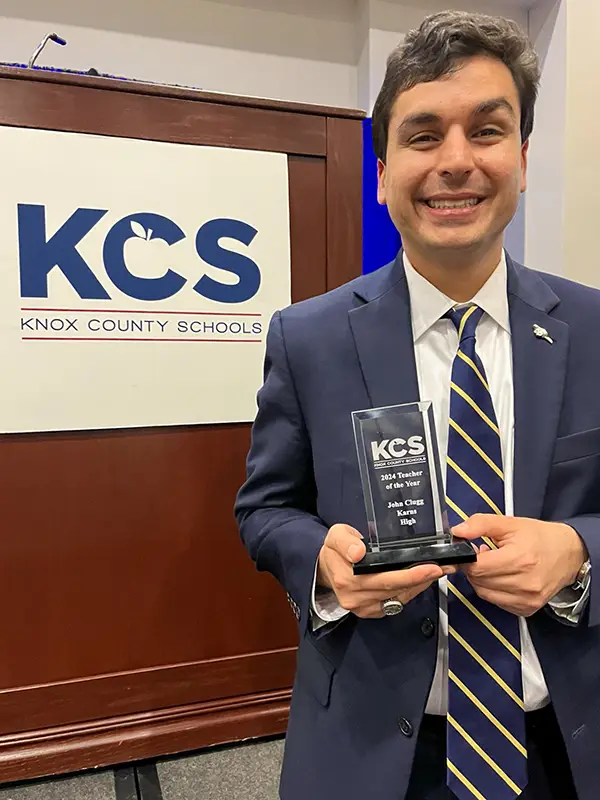Award-Winning Teacher Puts History First

For John Clugg (’21, ’22), the path to studying history at the University of Tennessee, Knoxville, and becoming a teacher started with his childhood interest in pirates.
While watching the Pirates of the Caribbean movies, he became fascinated by the British Empire and the Age of Discovery, when people across the world began to intermingle more. “It was the start of the world as we know it now, more globalization, more interconnectedness,” Clugg observed.
By middle school he knew that he wanted to be a teacher. Of course he was inspired by phenomenal educators, but also by his experience as a Boy Scout leading summer camps. As a high school senior in Illinois, he was part of a program that allowed him to teach US history alongside his middle school teacher four days a week, solidifying his career choice.
But Clugg didn’t want to be an education or a history education major in college. He was drawn to UT by a program that allowed him to be a history honors major with minors in education and political science, to student teach for a full academic year, and then complete one summer of classes to finish a master’s degree.
“It was a very well-rounded program that I liked quite a lot,” he said. “The cherry on top was the (Pride of the Southland) marching band, because I’ve always been a huge band kid my whole life.” That has continued into his current work as a social studies teacher at Karns High School, where he also helps with the band. “Being a member of the community outside of school hours is a very rewarding experience,” he said.
History Outside the Classroom
Clugg also spent summer 2023 in the community, through the National Park Service Teacher Ranger Teacher program. Working mainly at the Manhattan Project National Historical Park in Oak Ridge, he created educational resources for history teachers and taught visitors about the local sites when they visited the Children’s Museum of Oak Ridge.
“I would pull the maps out, pull out old photographs, and explain to them where they definitely need to go and where are really, really fascinating places to go to help understand the history of Oak Ridge and the history of the Manhattan Project, and its effect here in East Tennessee, and the effect that East Tennessee had on the entire world,” Clugg said.
Pictures he took in Oak Ridge during that program became slides for when he taught about the Manhattan Project in a US History class at Karns High School.
Connecting Students to History
In 2023-2024, his second year as a teacher, Clugg taught his first Advanced Placement class, piloted the high school’s prelaw program, and started a Model United Nations club. His peers at Karns recognized his efforts by selecting Clugg as one of five Knox County Teachers of the Year from the high school.
“When I was a student, my favorite teachers were always the teachers that made an effort to not only just teach the content, but also really get to know the students and understand their perspective about things and help make things relevant,” he said.
When Clugg teaches juniors about the Cold War in the US History class, they can take that discussion through the fall of the Soviet Union, the rise of Russian President Vladimir Putin, and the invasion of Ukraine.
Clugg was born in Russia, adopted from one of the country’s poorest orphanages on his first birthday, and raised in America. Now 25, he said, “Based on my age, if I never got adopted, I would be in the military, and I’d be in Ukraine right now.”
“I was born zero degrees of separation away from a lot of the world’s chaos,” he said.
Discussions about the aftermath of World War II include the creation of Israel and give students perspective on the current situation in the Middle East.
“Lots of conflicts that are happening right now, in 2024, we can easily explain by just understanding history,” Clugg noted.
When it comes to US history, his main interest is centered on the time leading up to and after the Civil War. In his honors thesis for the Department of History, Clugg investigated how the British perception of Abraham Lincoln changed after the president’s assassination.
“It’s very fascinating to learn about how America got involved in the bloodiest conflict in our history, and then was able to try and make recovery efforts to fix it,” he said. “I think it’s important to note that even after a civil war, our country still prevailed, and we still got it back together. We still figured it out. And that’s an important lesson to learn.”
By Amy Beth Miller